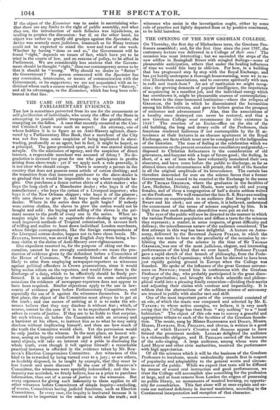THE OPENING OF THE NEW GRESHAM COLLEGE.
ON Thursday, the first day of Michaelmas term, the Gresham Pro- fessors assembled ; and, for the first time since the year 1767, the customary lecture was delivered in a College of their own! The occasion was most interesting ; but we ascended the steps of the new edifice in Basinghall Street with mingled feelings—some of pleasurable anticipation, others that under the healing influences of time we would fain bury in oblivion. For how, in a building that has progressed step by step with the Royal Exchange, an has yet hardly undergone a thorough housewarming, were we to re- vive Elizabethan associations, and to converse spiritually with men
in ruffs and trunk-hose ? An act of restitution we might recog- nize; the growing demands of popular intelligence, the impatience of acquiescing in a manifest job, and the individual energy which has overthrown it, might be pleasurable sources of contemplation: but where is the time-honoured institution—where the reliques of GRESHAM, the halls in which he disseminated the humanities among his fellow-citizens, and gave to forlorn genius the prospect
of eminence and advancement ? Alas, that the associations of a locality once destroyed can never be restored, and that a new Gresham College must recommence its civic existence in 1843 ! The erection of an Excise-office on the site of the old building, the long and dreary exile of the Professors, their functions rendered ludicrous if not contemptible by the ill at- tendance at their lectures in an obscure apartment at the Royal Exchange, are facts which must now be consigned to the indignation of the historian. The tone of feeling at the celebration which we
commemorate on the present occasion was conciliatory and grateful,—
disposed to Christian forbearance in the consideration of old grievances, and buoyant with a hope of future good ; the feeling, in short, of a set of men who have voluntarily immolated their own sinecures, and have come before the public to discharge, as far as altered times and circumstances will permit, the will of the founder in all the original amplitude of its benevolence. The curtain has therefore descended for ever on the solemn farces that a former Government had caused to be enacted at the Exchange in the name
of Sir THosies GRESHAM, where the graduates in the faculties of
Law, Medicine, Divinity, and Music, were mostly old and young females, and of these a congregation of half a dozen seldom waited
on the Professor. We well remember the late R. S. STEVENS reading a discourse on counterpoint to an audience that brought to mind Swis-r and his clerk; not one of whom, it is believed, understood the commonest of the terms of science employed by him. It is high time that such manifest absurdities were put an end to.
The eyes of the public will now be directed to the manner in which the various Professors popularize and diffuse a taste for the sciences they represent; a matter, in some respects, of great difficulty and delicacy, the miscellaneous nature of the audience considered. The first attempt in this way has been delightful. A lecture on Astro- nomy, delivered by the Reverend JOSEPH POLLEN, in which the
subject was made to bear on the peculiarity of the occasion by ex- hibiting the state of the science in the time of Sir THOMAS
Gaessum,:was one of the most judicious, elegant, and interesting
performances of the kind that we ever heard. Professor POLLEN gave a rapid sketch of that branch of philosophy, from the Ptolo-
maic system to the Copernican; which last he showed to have been
just rapidly gaining ground in Europe when the College was founded. He spoke of the influence of the great German astrono- mers on NEWTON; traced him in conferences with the Gresham
Professor of the day, who probably participated in the great disco- very of gravitation ; and brought the whole scientific and philoso- phical world into a pleasing family connexion—dividing their merits and adjusting their claims with candour and impartiality. It is seldom that the abstractions of the sublime science of astronomy are treated in public with similar tact and skill.
One of the most important parts of the ceremonial consisted of an ode, of which the music was composed and selected by Mr. E.
TAYLOR; to whose active energies, we believe, it is very much owing that the College has risen from "airy nothing" to a "local habitation." The object of this ode was to convey a graceful and appropriate tribute to each of the faculties of the Gresham founda- tion. The music, sung by Misses RAINFORTH and DOLBY, Messrs. Hones, HAWKINS, ROE, PHILLIPS, and chorus, is written in a good style, of which laynsi's Creation and Seasons appear to have formed the prominent models. LINDLBY delighted the audience in a violoncello obligato, and H. Pinisars carried off the honours of the solo-singing. A large audience, among whom were the Lord Mayor and other civic authorities, received the performance with high approbation.
Of all the sciences which it will be the business of the Gresham Professors to inculcate, music undoubtedly stands first in respect of popularity and adaptability to the general wants and circum- stances of the public. While we expect that taste will be diffused by means of sound oral instruction and good performances, we trust the College will accomplish also something for the profession at large, and at least remove from London the stigma of possessing no public library, no monuments of musical learning, no opportu- nity for consultation. This fact alone will at once explain and ex- cuse our national deficiency in learned musicians, according to the Continental interpretation and reception of that character.


























 Previous page
Previous page